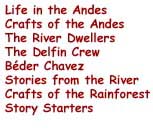

|
Saturday/Sunday, November 11 - 12, 2000 Traveling to a place a second time is a much different experience than seeing it for the very first time. It is a little like rereading a book. You know the plot—you've seen the major sights—so you can focus on the details and experience things you might have missed the first time when everything was so new and strange.
The early morning flight to Iquitos was beautiful. The sharp and angular Andes rose up like islands out of an ocean of clouds. The seemingly inhospitable mountains then gave way to the lush, green forest. The jungle canopy stretched as far as our eyes could see, broken only by the rivers and ox bow lakes. Tamara met us at the airport and we were delighted to see her after so much time. This is her last trip to study dolphins in the Pacaya-Samiria Reserve, and we feel so lucky to be sharing it with her. This time we will travel farther into the reserve than she—or even the boat crew—have ever been. We will donate our car battery to Ranger Station 5, the most remote station, when we leave. The battery is a "backup" to recharge our equipment, should we have a cloudy day or two and not be able to use our solar panels. Once we rested a bit, Tamara came by with Enzo, a Bolivian biologist who will be traveling with us. He and Tamara have a running "debate" as to which is more beautiful, the Bolivian or the Peruvian rainforest. Enzo also studies river dolphins. However, only the boto species lives in Bolivian rivers.
After a short rest, the five of us took motokars to the market to purchase last minute supplies that we will need for our trip. There are no markets within days of where we'll be traveling.
Tomorrow we will be on the river. |




